Dr. Stijn Thoolen is the ESA-sponsored medical doctor spending 12 months at Concordia research station in Antarctica. He facilitates a number of experiments on the effects of isolation, light deprivation, and extreme temperatures on the human body and mind. Find this blog post in the original Dutch below.
The end of our world is full of surprises…
November 13, 2019, East-Antarctic plateau
My arm is tired of wiping the freshly formed ice from my airplane window every two minutes, but I am too excited to stop. I almost can’t believe it. Everywhere I look is ice. We have been flying over this ice sheet at 5000 meters altitude for about three hours now, with nothing at all on the horizon. Absolutely nothing. And even the horizon seems to disappear at times, thanks to the surrealistic way in which the ever-present sunlight blends the white clouds and the ice together into an endless, motionless ocean of ice that almost makes us disappear as well. I am wondering if the pilots have a better idea of where we are, when suddenly two familiar towers appear in the distance. Concordia! My new home! And if I had any expectations from all the preparations of the past months (years), they were definitely exceeded. What a special and bizarre place, on the middle of that ice sheet, out of nothing: that people live here!
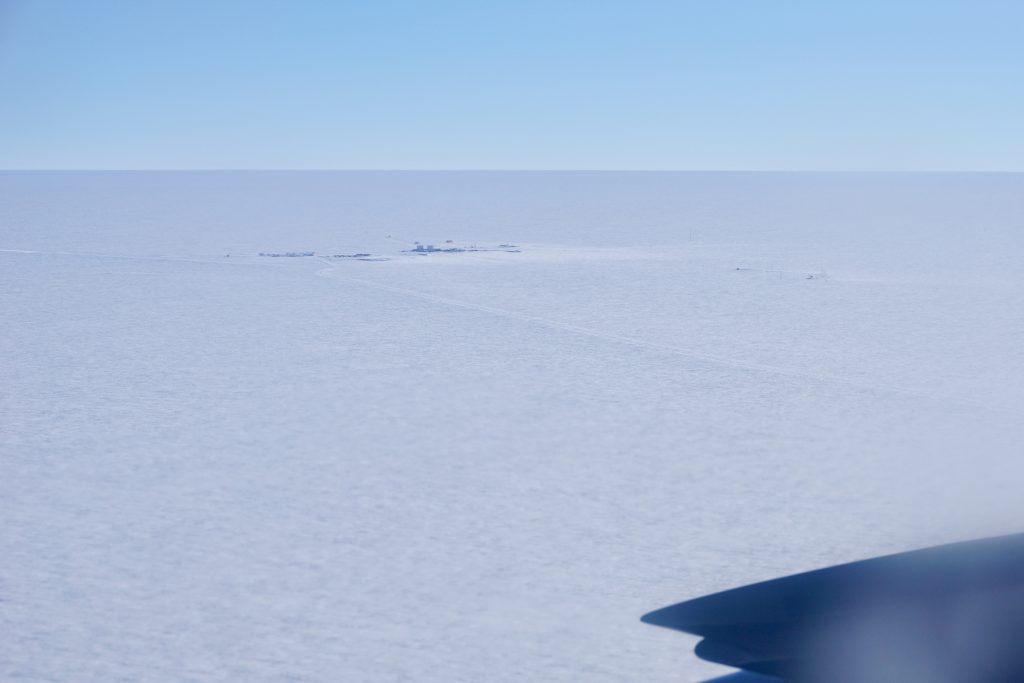
Can you really prepare for a journey to the end of the world? I hope that all the efforts of the past months haven’t been for nothing, but with all these surprises the past few days I am starting to doubt it. Since our arrival in Christchurch, New Zealand three days earlier, it has all gone by so terribly fast . We hadn’t even left the airport yet, badly jetlagged and desperate for a bed, when the IPEV/PNRA reception committee cheerfully told us that our next flight to Mario Zucchelli station was taking off sooner due to rising katabatic winds (I had to look it up). Here is your bag with polar gear, the key of your hotel room which you will never use, briefing in two hours, boarding in four – good luck!
It was another one of those confrontations with reality that seemed to unfold a little differently than I had wanted. But somehow I was reassured when I saw my four crewmates looking just as lost as I was. The fatigue didn’t make the situation any better, and perhaps it is not so bad then that you can’t control the situation anyway. “C’est l’Antarctique”, they say. In other words, don’t complain. You better deal with it.
So here we go again: Quickly shovel in some of the welcome refreshments, nervously improvise a set of warm clothing for our arrival in the cold, take one more picture with a stranger who thinks I am a polar hero (I have no clue myself anymore), and then at full speed, eyes shut, head towards the Hercules C130 for a third night on a plane.
It all feels quite strange to me. Everywhere I look reality forces itself upon me, and everywhere around me I see Antarctica: Antartica hotel, Antartica terminal, Antarctica posters and Antarctica pictures complete with Antarctica quotes, and even Antarctica as a bus destination (but how?). At the same time, the entire scene feels unreal (everything is so new, I have difficulty processing it). In the dark, in the rain, in my polar suit: as if I am part of a movie again. Just like all those other red and blue polar suits, I let myself be pushed into the cargo plane by Italian military personnel. Side by side, elbow in my face, feet stuck between bags, and the cameraman’s gear (it all looks quite serious actually!) on my lap, so that the Koreans and the French minister of science can also come aboard. Unreal, but so cool! Though my body would really like to, I can’t really sleep now. I feel really good. How lucky I am to witness all this! And while I enjoy everything that is happening around me, I decide to put on some appropriately cool music…
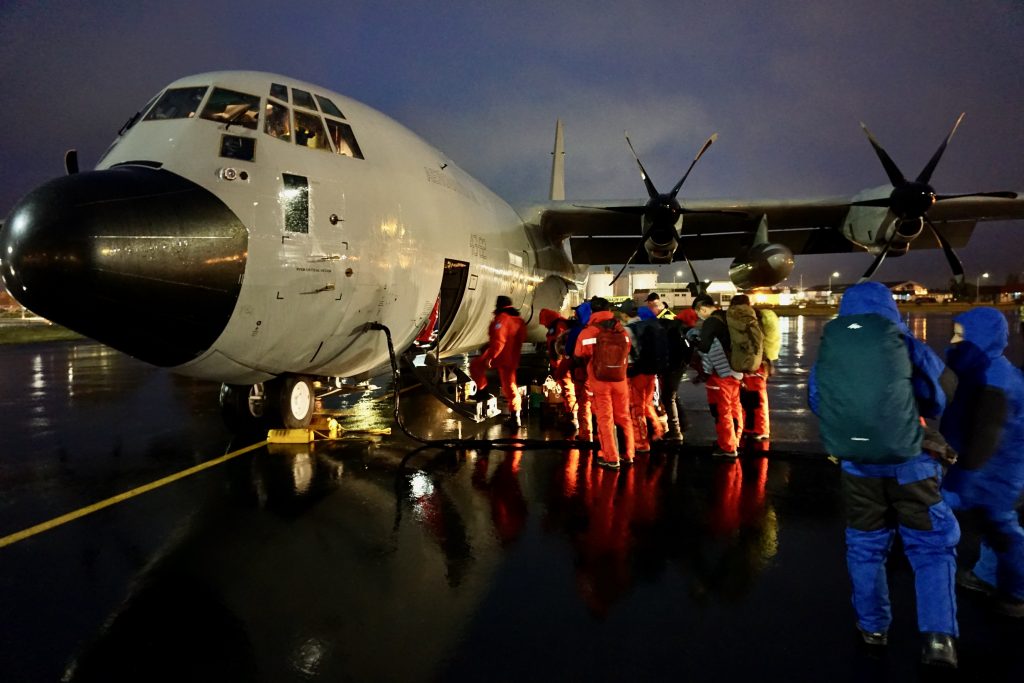
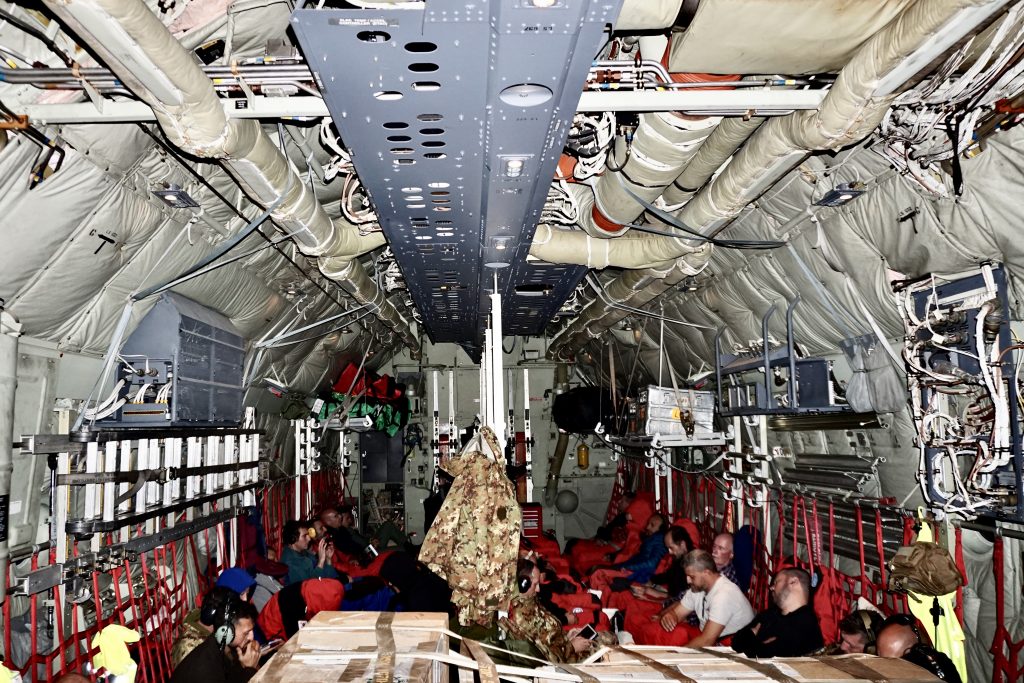
After a six hour-high in the plane I look outside and am surprised by the ‘mountains’ below that rise above the clouds. When I recover my wits (I am not the sharpest anymore at this point), I realise that there aren’t supposed to be any mountains or clouds out here. We are flying over ice, and this is (really) Antarctica.
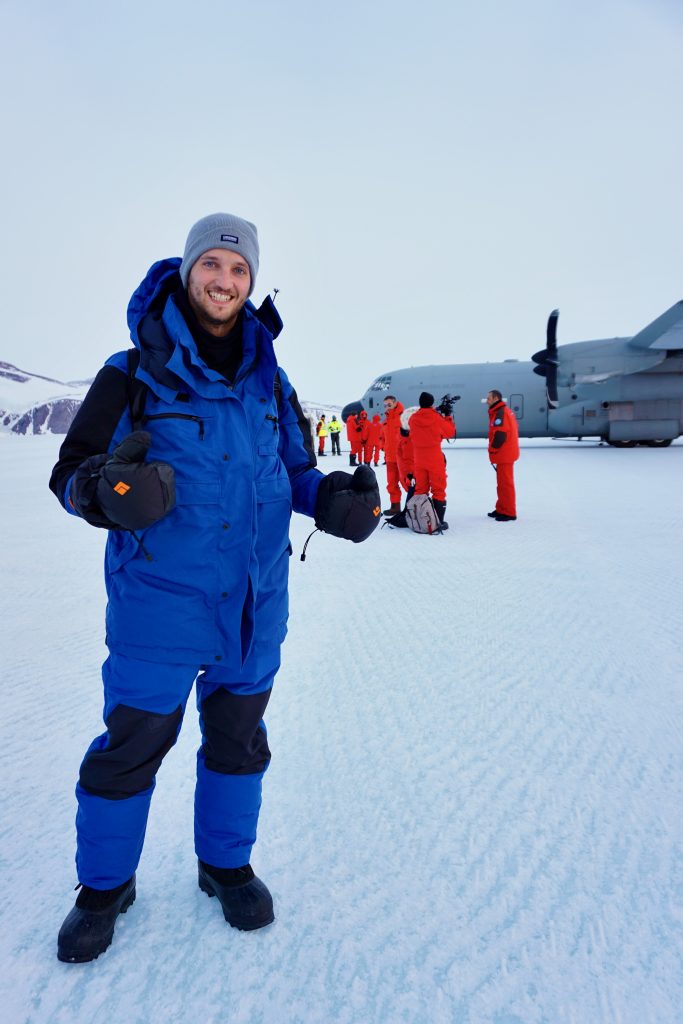
It was all so different from anything I had ever seen before, and I was constantly pleasantly surprised and amazed. I tried to absorb all these wonderful new impressions the best I could. At Mario Zucchelli we were lucky to have two days to do so, before we would continue our journey to Concordia. I was ecstatic from the pristine, unprecedented, almost out-of-this-world nature and the realisation that we had arrived at such a special place. My expectations continued to be blown out of the water.
December 29, 2019, Concordia
I have been here for a month and a half now. Back home, family and friends are interested: is it what I expected it to be? And I realize that I am struggling to answer that question. What were my expectations anyway? Did I really have any, or was it just plain curiosity? Or has the Antarctic already put a stop to it all?
My time here so far has taught me this: Things don’t really go the way you are used to, or the way you would perhaps want. Ideas and plans constantly change. Too many factors (weather, logistics, culture, you name it) have more to say here than you do, and that is something you better accept. The frequently used “C’est l’Antarcqtique” is the beautiful way of reminding you that it is better to leave your expectations behind, that you’re better off not clinging to your old ways of thinking too much. That way you won’t be so disappointed either. In any case, it definitely makes the surprises at the end of our world much more beautiful.
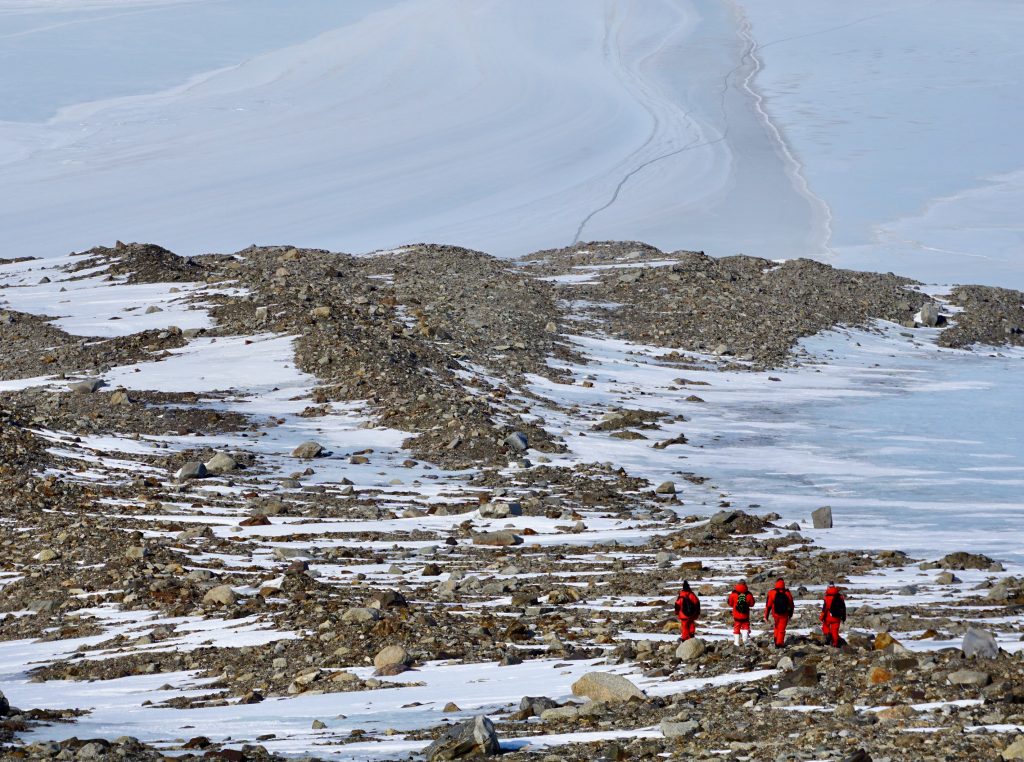
Maybe that alone is already worth this whole adventure. One of the positive psychological effects that polar sojourners can experience is termed in the literature as ‘salutogenesis’. In other words, you learn to think in a way that promotes your physical and mental well-being, based on an increased sense of understanding of the world around you, and trust that things will work out positively. Exposure to all these surprises and the positive stress they induce teaches us to cope better with new, sometimes difficult situations, and we become better at solving problems. It makes us flexible. The challenges of a new world can help us grow.
Perhaps the same thing applies to us as a crew this year. Expectations seem high sometimes, about what food should be served, what we can and cannot say to each other, or how we should spend our time to become a coherent crew. I like to think that such high expectations will only fill our thoughts and make us less receptive to anything new and less tolerant of the differences between us. And if then it doesn’t really work out the way we had planned (as long as 12 Stijns are not living in this station, I suppose that is inevitable), chances are high we get disappointed. But this way we would miss all the beautiful things we can learn from each other. If we are open to those surprises at the end of our world and allow ourselves to learn – after all that is the reason I got on that plane – I am sure it will be a wonderful year. C’est, after all, l’Antarctique.
Reis naar het einde van de wereld
Het einde van onze wereld zit vol verassingen…
13 november 2019, Oost-Antarctische ijskap
Mijn arm is er eigenlijk al een tijdje klaar mee om iedere twee minuten het vers gevormde ijs van mijn vliegtuigraampje weg te moeten wrijven, maar ik ben te enthousiast om er mee te stoppen. Het is namelijk haast niet te geloven. Overal waar ik kijk is ijs. We vliegen nu al zo’n drie uur lang op 5000 meter hoogte over dit plateau, met al die tijd helemaal niets aan de horizon. En zelfs die lijkt op sommige momenten te verdwijnen door de onwerkelijke manier waarop het altijd-aanwezige zonlicht de wolken en het ijs laat samensmelten. Een oneindige bewegingloze oceaan van ijs, die van ons eigenlijk weinig overlaat. Ik vraag me nog af of de piloten wel enig idee hebben waar we zijn, als plotseling in de verte de twee bekende torens tevoorschijn komen. Concordia! Mijn nieuwe thuis! En als ik al verwachtingen had door alles wat ik aan voorbereidingen had getroffen de afgelopen maanden (jaren), dan waren die nu flink overtroffen. Wat een bijzondere en bizarre plek, midden op dat plateau, uit het niets: dat hier mensen wonen!
Kun je je echt voorbereiden op een reis naar het einde van de wereld? Ik hoop toch niet dat al die inspanningen de afgelopen tijd voor niets zijn geweest, maar met al die verrassingen de afgelopen dagen begin ik er een beetje aan te twijfelen. Sinds onze aankomst in Christchurch, Nieuw-Zeeland, drie dagen eerder was het ineens weer zo vreselijk snel gegaan. We waren het vliegveld nog niet uit, gaar, ge-jetlagged, en snakkend naar een lekker bed, toen het IPEV/PNRA-ontvangstcomité ons vrolijk kwam vertellen dat onze volgende vlucht naar Mario Zucchelli vanwege de opkomende katabatische winden (ik moest het ook even opzoeken) vervroegd was naar vandaag. Hier is je tas met pooluitrusting, de sleutel van je hotelkamer waar je geen gebruik van kan maken, briefing over twee uur, boarden over vier uur, succes!
Weer zo’n confrontatie met de realiteit, die toch een beetje anders liep dat ik misschien zou willen. En ergens was ik wel gerustgesteld dat ik mijn vier crewgenoten ook verdwaasd om zich heen zag kijken. Van de vermoeidheid werd de situatie ook niet echt overzichtelijker, en misschien is het dan zo slecht nog niet dat je het allemaal toch niet in de hand hebt. ‘C’est l’Antarctique’, werd er gezegd. Oftewel, niet zeiken, je doet het er maar mee.
Dus vooruit dan maar, daar gaan we weer. Vlug wat van de welkomstborrel (het laatste avondmaal) naar binnen proppen, zenuwachtig wat warme kleding bij elkaar improviseren voor onze aankomst in de kou, nog even op de foto met een vreemdeling die denkt dat ik een poolheld ben (zelf weet ik het allemaal allang niet meer), en dan met volle vaart en oogkleppen op richting Hercules C130 voor een derde nacht in het vliegtuig.
Ik vind het maar een vreemde gewaarwording. Overal om me heen dringt de realiteit zich op, en overal om me heen zie ik Antarctica: Antarctica hotel, Antarctica terminal, Antarctica posters en Antarctica foto’s compleet met Antarctica spreuken, en zelfs Antarctica als bestemming op de bus (maar hoe dan?). Tegelijkertijd voelt de hele scene onwerkelijk (alles is zo nieuw, dat ik het eigenlijk maar moeilijk verwerkt krijg). In het donker, in de regen, in mijn poolpak. Alsof ik weer eens in een film beland ben. Ik laat me maar net als al die andere rode en blauwe poolpakken door de Italiaanse militairen het vrachtvliegtuig in duwen. Zij aan zij, elleboog in mijn gezicht, voeten tussen tassen bekneld, en de spullen van de cameraman (het lijkt wel serieus allemaal!) op mijn schoot, zodat de Koreanen en de Franse minister van wetenschap ook nog even mee kunnen. Onwerkelijk, maar wat enorm cool! Mijn lichaam zou wel willen, maar slapen kan ik nu eigenlijk ook niet meer. Ik voel me enorm goed. Dat ik dit allemaal mag mee maken! En terwijl ik geniet van alles wat er om me heen gebeurt, zet ik er maar een passend, cool muziekje bij op…
Na een high van een uur of zes in dat vliegtuig kijk ik naar buiten, en verbaas ik me over de ‘bergen’ die beneden ons boven de wolken uitsteken. Zodra ik mezelf herpakt heb (ik ben op dit moment niet de snelste meer), besef ik me dat hier helemaal geen bergen of wolken zouden moeten zijn. We vliegen over ijs, en dit is (toch echt) Antarctica.
Het was hier allemaal zo anders dan wat ik ooit eerder had gezien, en ik voelde me eigenlijk continue blij verrast. Verwonderd. Ik probeerde al die prachtige nieuwe indrukken maar zo goed mogelijk in me op te nemen, en in Mario Zucchelli hadden we daar gelukkig twee dagen de tijd voor, voordat we onze reis zouden vervolgen naar Concordia. Opgewekt door de ongerepte, ongekende, bijna buitenaardse natuur en de realisatie dat we op zo’n bijzondere plek waren beland, werden onze verwachtingen ook die dagen overtroffen.
29 december 2019, Concordia
Inmiddels ben ik hier anderhalve maand, op deze bijzondere plek. Thuis zijn familie en vrienden geïnteresseerd: is het allemaal wat ik ervan verwacht had? En ik realiseer me dat ik die vraag maar lastig kan beantwoorden. Wat waren eigenlijk mijn verwachtingen? Had ik die wel, of was het alleen maar nieuwsgierigheid? Of heeft Antarctica er al korte metten mee gemaakt?
Dat heeft de tijd hier me inmiddels wel duidelijk gemaakt. Het gaat hier niet bepaald zoals je gewend bent, of zoals je soms graag zou willen. Ideeën en plannen worden continue gewijzigd. Te veel factoren (weer, logistiek, cultuur, verzin het maar) hebben hier meer te zeggen dan jij, en dat kun je maar beter voor lief nemen. Het veelvuldig gebruikte ‘C’est l’Antarctique’ is dan de prachtige manier om te zeggen dat je je verwachtingen maar beter achter je kan laten, dat je maar beter niet te veel probeert vast te houden aan je oude denkpatronen. Dan word je ook niet zo teleurgesteld. In ieder geval maakt het de verassingen op het einde van onze wereld een stuk mooier.
Misschien is alleen dat het hele avontuur al waard. Eén de positieve psychologische effecten die poolreizigers kunnen ervaren wordt in de literatuur beschreven met de term ‘salutogenesis’. Ofwel, je leert op een manier te denken die bijdraagt aan een fysieke en mentale gezondheid, op basis van een toegenomen begrip voor de wereld om je heen, en vertrouwen dat dingen goed zullen aflopen. Door blootstelling aan al die verassingen, een positieve stress, leren we beter omgaan met nieuwe, soms moeilijke situaties, en worden we beter in het oplossen van problemen. We worden er flexibel van. De uitdagingen van een nieuwe wereld kunnen ons helpen om te groeien.
Misschien geldt voor ons als crew wel hetzelfde dit jaar. De verwachtingen lijken soms hoog, over wat er op tafel moet staan, wat we wel en niet tegen elkaar mogen zeggen, of hoe we onze tijd moeten doorbrengen om een hechte bemanning te worden. Ik denk graag dat zulke hoge verwachtingen enkel onze gedachten kunnen vullen, en ons minder ontvankelijk kunnen maken voor nieuwe dingen, minder tolerant voor de verschillen tussen ons. Als het dan toch even anders gaat dan bedacht (zolang er geen 12 Stijn’s op dit station wonen lijkt me dat onvermijdelijk), is de kans op teleurstelling groot. Op zo’n manier zouden we alle mooie dingen die we nog kunnen leren van elkaar missen. Maar als we open staan voor die verassingen aan het einde van onze wereld en onszelf toestaan om te leren, en dat is toch wel waarom ik in dat vliegtuig ben gestapt, dan wordt het ongetwijfeld een prachtig jaar. C’est per slot van rekening l’Antarctique.



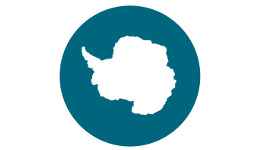
Discussion: 4 comments
Such an engaging post. The enthusiasm is obvious and I hope to Dr. Stijn Thoolen writes often. I’d love to hear more of his experiences.
The word profound is not powerful enough to describe the respect I feel for all those stalwart scientists living on the ‘edge’ of our world, who bravely confront an aspect of our planet so brutal that would crush most human beings’ spirits. I dream of another life where I would have walked the path my heart dictates, the path whose pilgrims attempt to answer the enigmas nature utters, the wonderful yet arduous path of science. I wish you and all the remarkable crew who inhabit Concordia to overachieve your desires and return from that otherworldly land wiser.
Thank you, it was beautifully written,
Please continue doctor.
Interesting.